
Chemists, university leaders, and education researchers collectively acknowledge the slow progress towards advancing diversity, equity, inclusion in science, technology, engineering, mathematics (STEM) fields nationwide. Given this troubling reality, underrepresentation of Black, Latinx, and Indigenous students remains a pressing concern in chemistry and biochemistry. The severe underrepresentation of students of color is largely attributed to deeply rooted systemic racial inequities and opportunity gaps in chemistry contexts.
The Department of Chemistry and Biochemistry (CBC) is deeply committed to enact systemic transformation efforts to cultivate an equitable, inclusive educational environment to better facilitate the success of Black, Latinx, and Indigenous chemistry and biochemistry majors. We are excited to launch a new, research-based mentoring program: Mentoring Undergraduate Scholars for Excellence (MUSE). CBC’s rationale for the development of an undergraduate mentoring program is grounded in research and evidence suggesting that effective mentoring experiences are strongly linked to sense of belonging, retention and success in STEM fields and consequently STEM professions.
With a central focus on increasing retention of URM students, the major goals of CBC’s MUSE program are to:
- Provide necessary academic and social supports to facilitate the learning and success of incoming undergraduate chemistry and biochemistry students of color;
- Create a supportive, diverse community of chemistry and biochemistry scholars;
- Offer upper-level students of color opportunities to enhance leadership skills and disciplinary practices.
MUSE is a formal, one-year program offered to incoming Black, Latinx, and Indigenous students enrolled as chemistry and biochemistry majors, launched in January 2021. The selected mentors are upper-level, high achieving Black, Latinx, and Indigenous students chemistry and biochemistry majors who have successfully completed the general chemistry and organic chemistry course sequence.
MUSE program structure
Student participants will attend a kick-off social event to meet and interact with potential mentors. Student preferences will then be considered to assign mentees with mentors. Each mentor will be assigned to two mentees. Each mentor-mentee will informally meet once every two weeks during the semester. All mentees and mentors will attend 4 learning communities each semester to collectively discuss key topics such as learning strategies for chemistry coursework, effective use of technology, networking opportunities, and preparation for scientific careers.
To ensure sustained active engagement, positive mentoring experiences, and academic success, the MUSE program is structured to financially compensate students with scholarships per semester, paid summer research opportunities, and additional resources to support learning and enhance mentor-mentee relationships. One semester of MUSE is depicted below.
If interested, please contact Dr. Jennifer Collins at collins.1711@osu.edu.

